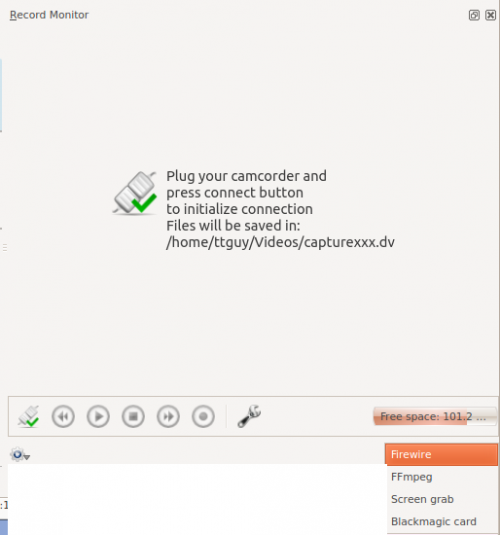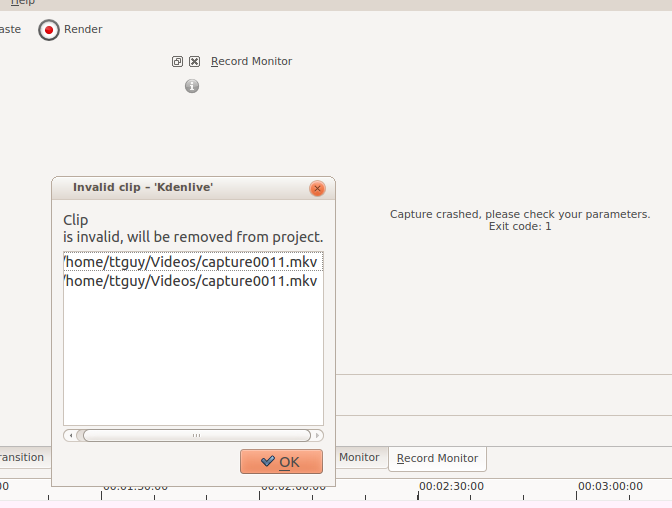Archive:Kdenlive/Manual/Capturing/en: Difference between revisions
Updating to match new version of source page |
Updating to match new version of source page |
||
| Line 14: | Line 14: | ||
=== Firewire === | === Firewire === | ||
This captures video from sources connected via a firewire (also known as - IEEE 1394 High Speed Serial Bus) card and cable. | This captures video from sources connected via a firewire (also known as - IEEE 1394 High Speed Serial Bus) card and cable. This functionality uses the [http://linux.die.net/man/1/dvgrab dvgrab] program and the settings for this can be customized by clicking the spanner icon or choosing <menuchoice>Settings>Configure Kdenlive</menuchoice> See [[Kdenlive/Manual/Settings_Menu/Configure_Kdenlive#Configure_Firewire_Capture|Configure Firewire Capture]] | ||
To perform a capture: | |||
* | * Plug in your device to the firewire card and turn it on to play mode | ||
* | * Click the ''Connect Button'' [[File:Kdenlive Connect firewire button.png]] | ||
* | * Click the Record Button - note it toggles to grey while you are recording | ||
* | * Click the Record button again to stop capture. Or click the stop button. | ||
* Once capturing is finished click the disconnect button [[File:Kdenlive Disconnect capture.png]] | |||
* In the ''Captured Files'' dialog - click the import button to have the captured files automatically imported into the project tree. | |||
[[File:Kdenlive Captured files dialog.png]] | |||
'''Note''': If your device does not start playing the source device when you click the record button then you may have to start playback on your device manually and then click record. | |||
=== FFmpeg === | === FFmpeg === | ||
Revision as of 17:29, 5 February 2013
Capturing
Kdenlive provides functionality for capturing video from external devices - Firewire, FFmpeg, Screen Grab and Blackmagic.
You configure video capturing from (more on this here).
You define the location your captures will end up using (more on this here).
To execute a video capture select the Record Monitor and choose the capture device from the drop down in the bottom right.
Firewire
This captures video from sources connected via a firewire (also known as - IEEE 1394 High Speed Serial Bus) card and cable. This functionality uses the dvgrab program and the settings for this can be customized by clicking the spanner icon or choosing See Configure Firewire Capture
To perform a capture:
- Plug in your device to the firewire card and turn it on to play mode
- Click the Connect Button

- Click the Record Button - note it toggles to grey while you are recording
- Click the Record button again to stop capture. Or click the stop button.
- Once capturing is finished click the disconnect button

- In the Captured Files dialog - click the import button to have the captured files automatically imported into the project tree.
Note: If your device does not start playing the source device when you click the record button then you may have to start playback on your device manually and then click record.
FFmpeg
I believe this captures video from an installed Web Cam using Video4Linux2.
Screen Grab
This captures video of the PC screen. In version 0.9.2 it uses recordMyDesktop to do the capture. There is an open defect with this functionality in ver 0.9.2 - See bug tracker ID 2643.
In version 0.9.3 the Screen grab is done by the ffmpeg functionality instead. For screen capture to work in ver 0.9.3 the version of ffmpeg installed needs to have been compiled with the --enable-x11grab option. Ubuntu comes with an ffmpeg compiled with this option.
To check on your linux distro type "ffmpeg -version" in a terminal and look for --enable-x11grab in the reported configuration info. [1]
If you are capturing screen and using the X246 with audio settings and you get a crash as shown in the screen shot ...
... then consider creating a profile for audio capture where -acodec pcm_s16le is replaced by -acodec libvorbis -b 320k. See Configure Kdnelive
Blackmagic
This is for capturing from Blackmagics decklink video capture cards (AFAIK). Not sure how stable this code is at the moment. See defect 2130.
Footnotes
- ↑ There are two branches of ffmpeg now a Libav branch and a ffmpeg.org branch. The ffmpeg version from the later reports the configuration when you run with "ffmpeg -version". The Libav version does not. So this method to check for the --enable-x11grab does not work if you have libav version of ffmpeg.



